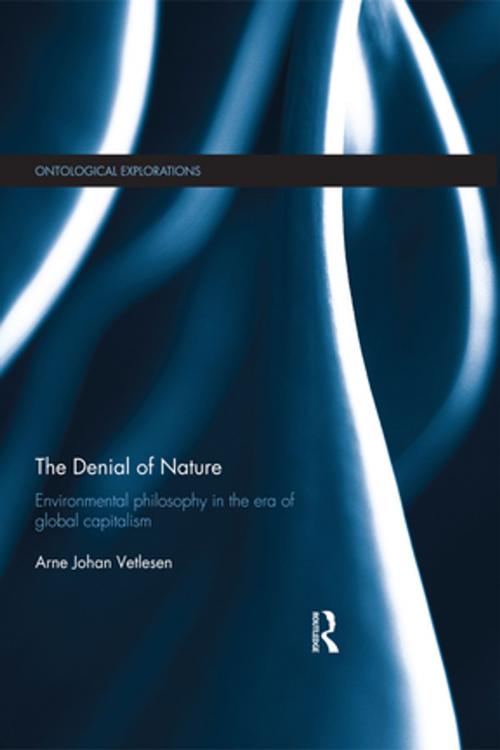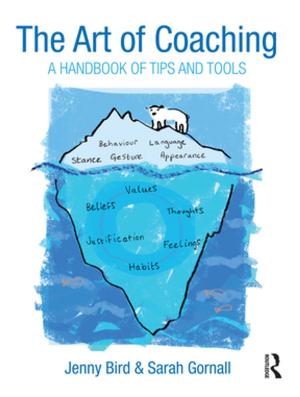The Denial of Nature
Environmental philosophy in the era of global capitalism
Nonfiction, Social & Cultural Studies, Social Science, Sociology| Author: | Arne Johan Vetlesen | ISBN: | 9781317906377 |
| Publisher: | Taylor and Francis | Publication: | February 11, 2015 |
| Imprint: | Routledge | Language: | English |
| Author: | Arne Johan Vetlesen |
| ISBN: | 9781317906377 |
| Publisher: | Taylor and Francis |
| Publication: | February 11, 2015 |
| Imprint: | Routledge |
| Language: | English |
A study of the increasingly precarious relationship between humans and nature, this book seeks to go beyond work already contributed to the environmental movement. It does so by highlighting the importance of experiencing, rather than merely theorizing nature, while realizing that such experience is becoming increasingly rare, thus reinforcing the estrangement from nature that is a source of its ongoing human-caused destruction. In his original approach to environmental philosophy, the author argues for the reinstatement of nature's value outside of its exploitative usefulness for human ends. Such a perspective emphasizes the extent to which the environmental problem is a concrete reality requiring urgent action, based on a multi-sensuous appreciation of humans' dependence on nonhuman lifeforms.
Designed as an accompaniment to undergraduate and postgraduate research, The Denial of Nature draws on empirically informed literature from the social sciences to examine what life is really like for humans and nature in the era of global capitalism. The book contends that capitalist society exploits nature - both in the form of human capital and natural capital - more relentlessly than any other and offers an environmental philosophy which actively opposes current developments. Through discussions of the work of Teresa Brennan, Theodor Adorno, Martin Heidegger and Hans Jonas, and through a radical critique of the nature deficit in Jürgen Habermas' theory of capitalist modernity, The Denial of Nature relies on insights from Critical Realism to bring together several, seldom-linked philosophies and suggest a new approach to the heavily-discussed question of environmental ethics.
**Arne Johan Vetlesen is Professor of Philosophy at the University of Oslo, Norway and the author of twenty books among them *Perception, Empathy and Judgment: An Inquiry into the Preconditions of Moral Performance *(1994), *Closenes: An Ethics *(with H. Jodalen; 1997), Evil and Human Agency (2005) and A Philosophy of Pain (2010).
.
A study of the increasingly precarious relationship between humans and nature, this book seeks to go beyond work already contributed to the environmental movement. It does so by highlighting the importance of experiencing, rather than merely theorizing nature, while realizing that such experience is becoming increasingly rare, thus reinforcing the estrangement from nature that is a source of its ongoing human-caused destruction. In his original approach to environmental philosophy, the author argues for the reinstatement of nature's value outside of its exploitative usefulness for human ends. Such a perspective emphasizes the extent to which the environmental problem is a concrete reality requiring urgent action, based on a multi-sensuous appreciation of humans' dependence on nonhuman lifeforms.
Designed as an accompaniment to undergraduate and postgraduate research, The Denial of Nature draws on empirically informed literature from the social sciences to examine what life is really like for humans and nature in the era of global capitalism. The book contends that capitalist society exploits nature - both in the form of human capital and natural capital - more relentlessly than any other and offers an environmental philosophy which actively opposes current developments. Through discussions of the work of Teresa Brennan, Theodor Adorno, Martin Heidegger and Hans Jonas, and through a radical critique of the nature deficit in Jürgen Habermas' theory of capitalist modernity, The Denial of Nature relies on insights from Critical Realism to bring together several, seldom-linked philosophies and suggest a new approach to the heavily-discussed question of environmental ethics.
**Arne Johan Vetlesen is Professor of Philosophy at the University of Oslo, Norway and the author of twenty books among them *Perception, Empathy and Judgment: An Inquiry into the Preconditions of Moral Performance *(1994), *Closenes: An Ethics *(with H. Jodalen; 1997), Evil and Human Agency (2005) and A Philosophy of Pain (2010).
.















